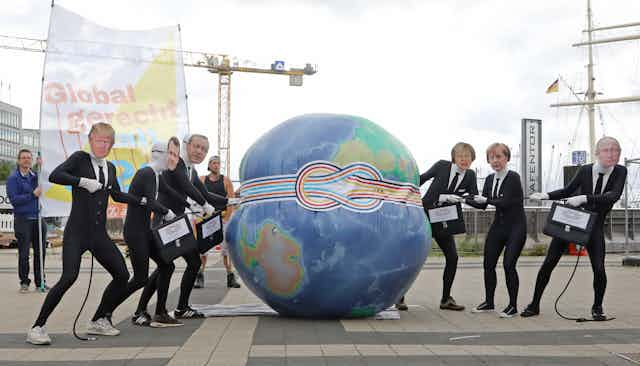Global summits were once extraordinary things, marking turning points in international political history. The 1814-15 Congress of Vienna marked the end of the Napoleonic Wars and the beginning of Europe’s “long” 19th century, during which Europe’s interactions were regulated by a relatively stable balance of power. The 1945 San Francisco Conference put an end to the 20th century’s world wars and ushered a rules-based, liberal international order under the multilateral stewardship of the UN.
These were truly special affairs, and rare too, what with the logistics and risks of bringing leaders together to meet face-to-face. But revolutions in transportation have made this no longer so, and any national leader’s calendar is now stuffed with summits all year round. They generally don’t exactly define centuries and epochs, and they often barely command enough attention to survive a modern news cycle.
So it’s tempting to consign this year’s G20 summit in Hamburg to the long list of those that don’t amount to much as far as the long gaze of history is concerned. But, in time, it might be remembered as something rather momentous: the summit that marked the symbolic – if not substantive – end of America’s international leadership.
Above and beyond the day-to-day stories of Donald Trump’s mishaps and bizarre behaviour, the American-led international order as we know it is disintegrating. This is a fundamental transition; under Trump, the US continues to retreat from its traditional role as the global guarantor of stability and security, leaving the EU and China to jostle for the mantle of leadership.
Political support for American internationalism began to fray in the mountains of Afghanistan and the deserts of Iraq during George Bush’s tenure in the Oval Office. The ebbing of leadership was authoritatively signalled with Barack Obama’s apparent inclination to “lead from behind”, especially evident in the West’s Libyan intervention; it was confirmed by his reluctance to enforce his own red line in Syria and to guarantee the territorial integrity of Ukraine. Trump’s decision to pull the US out of the Trans-Pacific Partnership and the Paris climate agreement were the next steps in this slow walk away from global leadership.
So what next – and indeed, who next to lead?
East and West
In their different ways, the EU and China are both positioned to fill the vacuum left by America’s abdication. As the host of this year’s summit, Angela Merkel is best able to steer things to Europe’s advantage. This is especially so now she’s accompanied by Emmanuel Macron who is ready and willing to spend his newly-won political capital on shoring up European unity – a job made easier by Brexit, with Britain giving up the position that allows it to play spoiler in Brussels.
Germany’s agenda for the summit focuses closely on shoring up the existing multilateral order, keeping the likes of the United Nations, the International Monetary Fund, the World Bank and so on at the centre of the global governance architecture. The aim is to keep the liberal, multilateral, rules-based order in place, even if America is no longer willing to underwrite it.

But China too is working to clinch the top spot, most notably by continually reaffirming its commitment to the sort of internationalism that was formerly an American hallmark. It’s doubling down on its commitment to the Paris agreement, pursuing its Belt and Road development agenda with unyielding zeal, and championing the UN’s Sustainable Development Goals.
What’s significant is not that China is taking a lead part on the world’s stage while America stumbles towards the wings, but that in doing so, it’s following the liberal, multilateral, rules-based script rehearsed by America for the past 70-odd years.
Regardless of who is able to steer things their way, all signs suggest that even as America forfeits its privileged position, those willing to take its place are ready to lead according to the same mechanisms – if not principles – that defined the Pax Americana. When the G20 release this year’s communique on July 8, it might be the best clue yet to who will lead the multilateral order – and how.

